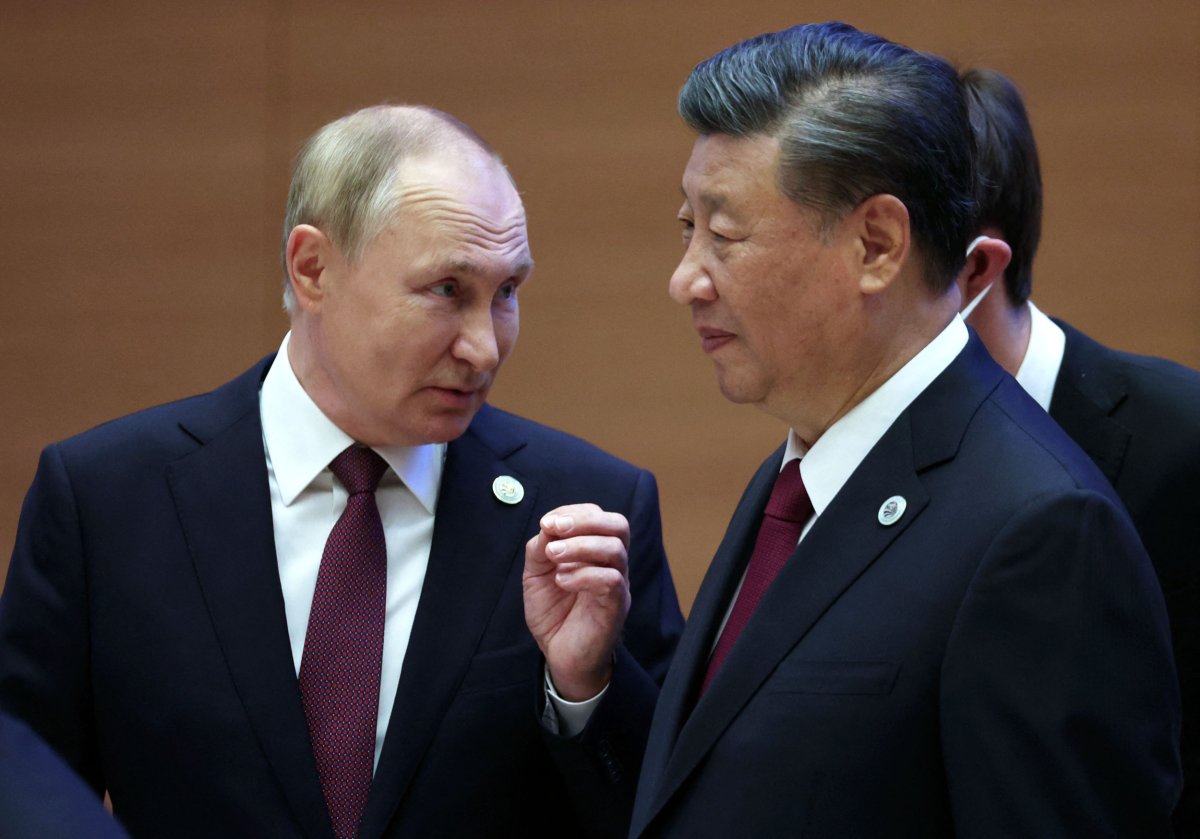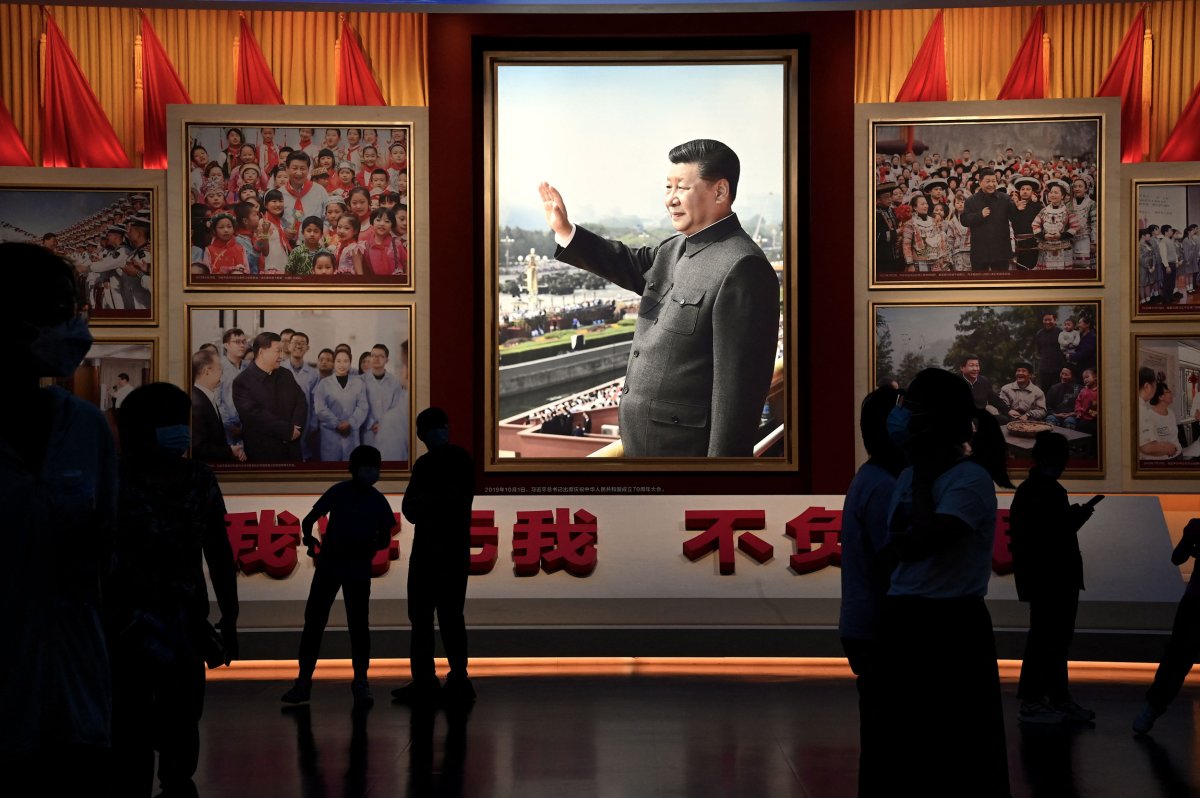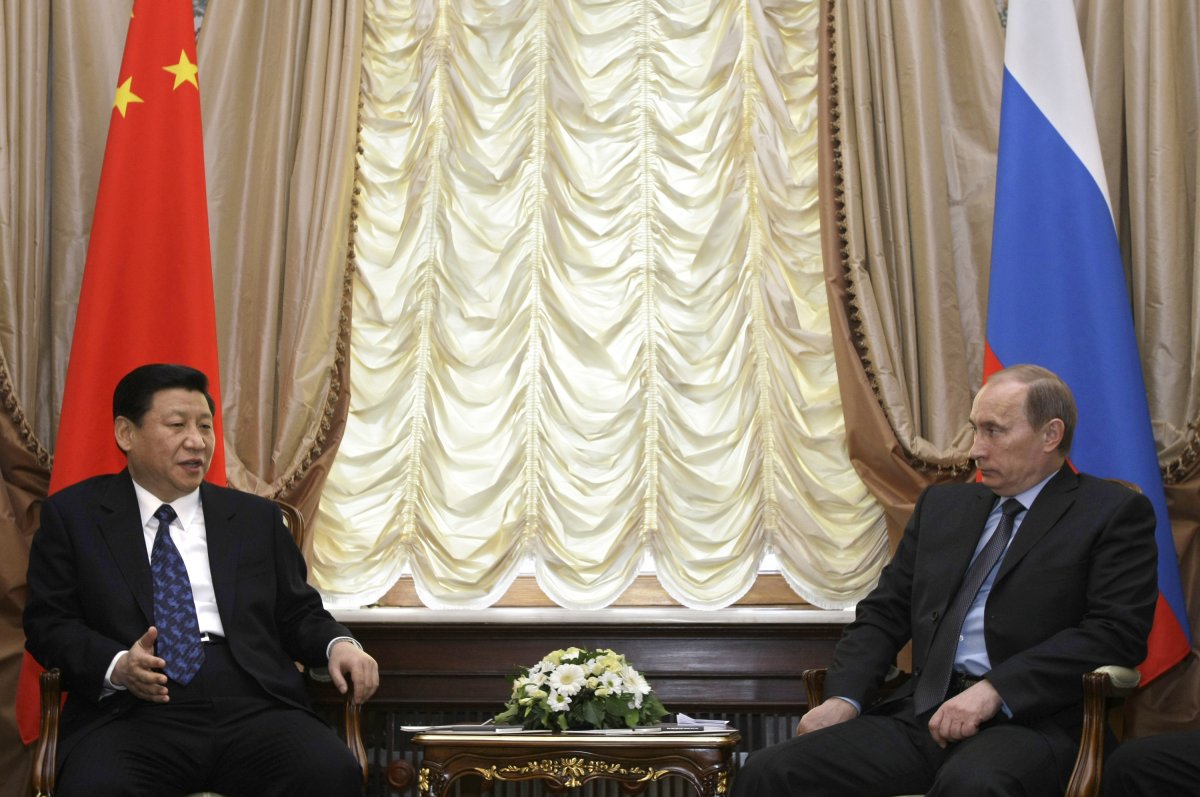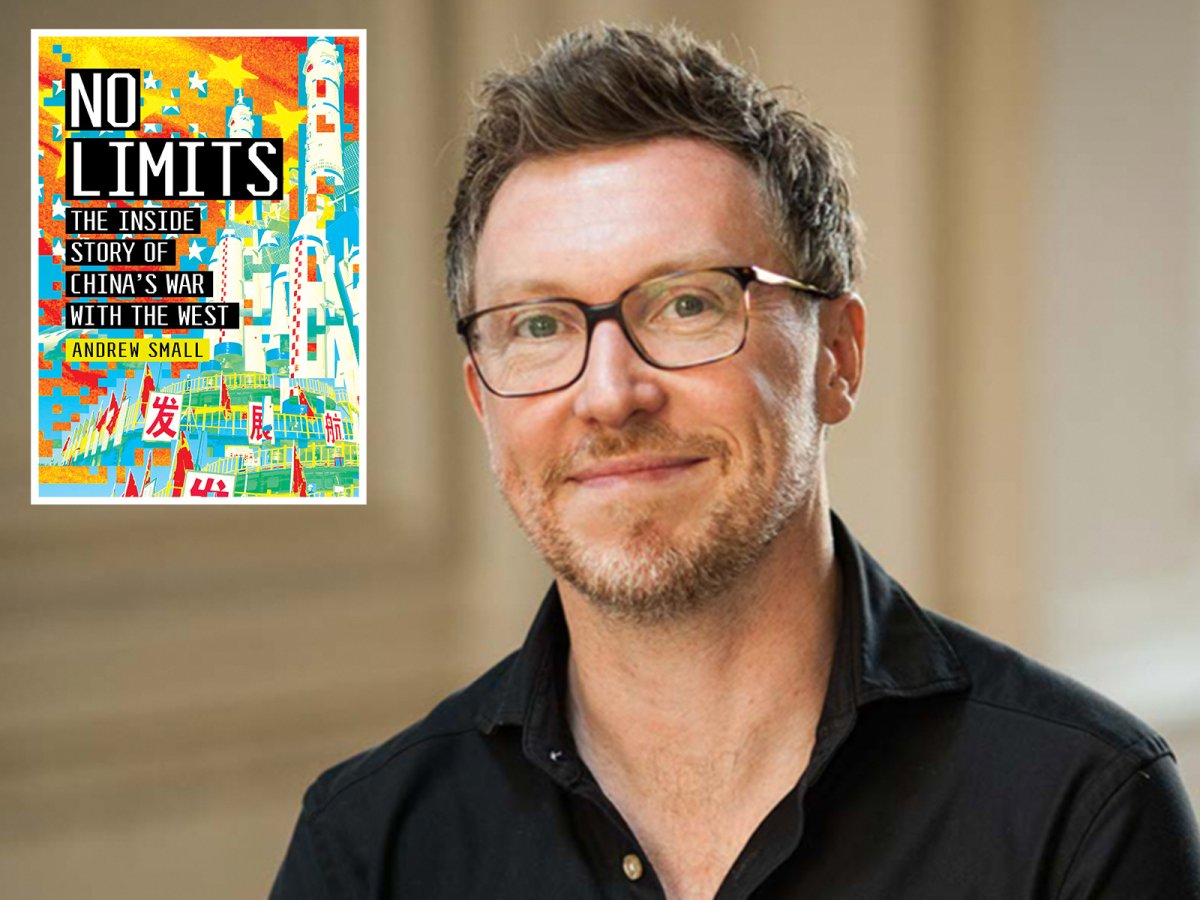Russia's war in Ukraine may have estranged Vladimir Putin from the West for good, but amid strategic defeats and embarrassing retreats on the battlefield, he could always count on one constant: Xi Jinping and the force of China's support for his grievances against the West.
After an acrimonious end to dealings with Donald Trump, China might have had a welcome respite from Joe Biden's coalition building too. But as Russian troops amassed on Ukraine's borders at the beginning of the year, "Xi Jinping seemed determined to tie Beijing's fate as closely and visibly to Russia's as possible," Andrew Small, a Berlin-based researcher with the German Marshall Fund of the United States think tank, writes in his new book.
In the early weeks of the invasion, Chinese officials tried to put some daylight between Beijing and Moscow. In March, Qin Gang, China's ambassador in Washington, took to the opinion pages of The Washington Post "to explain fully and dispel any misunderstandings and rumors."
"Assertions that China knew about, acquiesced to or tacitly supported this war are purely disinformation," he wrote. "Conflict between Russia and Ukraine does no good for China. Had China known about the imminent crisis, we would have tried our best to prevent it."
Qin and others were finding discreet ways to distance themselves from Putin's war, Small told Newsweek, "because it was a genuine reflection of what they thought at the time." "I think there are lots of people in the Chinese system who thought it was a bad move, and they didn't want to be associated with it."
Soon, however, Beijing was no longer hedging its position, even if it wasn't publicly endorsing the Kremlin's actions. "And then Xi Jinping steps out and this line on the question just stops. The line instead was NATO is responsible and the U.S. is responsible, and one should essentially sympathize with the position of the large country that's been pushed up against the wall," Small said.
China's president reinstated his worldview and the prevailing vision for his country's seemingly implacable quasi-alliance with its most important neighbor, with whom he is pursuing an economic and ideological order to rival the West.

Small's book, No Limits: The Inside Story of China's War With the West, offers a compelling, first-person perspective on the West's awakening to the systemic challenges posed by China, a development that swept up previously sanguine Democrats of the Barack Obama era, who were suddenly offered a chance to correct course under the incoming Biden administration. At the same time, there were ongoing efforts to ensure that European leaders kept up with the pace of change.
The book retells key moments during Trump's tenure, which rocked domestic politics but also marked a seismic shift in Washington's decades-long approach to Beijing. That administration's China hands began a unilateral process of increased scrutiny, protectionism and divestment that has continued under the global agenda of his multilateralist successor.
"The early 2000s were a period of near-unabashed mutual enthusiasm among Chinese and European policymakers, and the Beijing of that time seemed physically to incarnate the sense of opportunity," Small wrote in his introduction. Today, the world's two largest economies are engaged in a full-spectrum rivalry across sectors that include global leadership, political governance, trade and finance, high technology and military hard power.
On one side of the U.S.-China divide are American policymakers who see a China that had benefited from the international rules-based order it was now seeking to replace with its own standards, values and ideologies. On the other side are Chinese elites who are tired of playing second fiddle to a hegemon that says one thing and does another—and will stop at nothing to contain China's rise.
There's also 5G and COVID-19. House Speaker Nancy Pelosi backed Trump against the "Sinification" of the next generation of online interconnectedness. During the pandemic, China determinedly mocked what it saw as governance failures in the West. It also sought to exploit a power vacuum by confidently presenting Chinese wisdom and Chinese solutions to the world's pressing issues.
A "new Cold War" doesn't quite capture it, although Small sees strong ideological elements in China's suggestions. Yet it's not a simple case of great power competition either. "It is an entire system that the Chinese party-state is challenging, a fact that Beijing has always been far clearer about than most of those on the receiving end," he said.
"There are no small matters in foreign affairs," Zhou Enlai, China's first foreign minister, is often remembered for saying. And so from the big to the small. No Limits also provides an authoritative account of how Lithuania's relationship with China had already reached a point of serious strain, before Vilnius' relations with Taiwan sparked a diplomatic feud with Beijing, dissatisfaction in Brussels and finger-wagging in Washington.
Finally, there's Russia, a Chinese strategist's "greatest prize" that moved slowly into Beijing's orbit after Putin pursued his imperial ambitions in Georgia in 2008 and again in Ukraine in 2014, seemingly without repercussions, until he overplayed his hand this spring. "Putin's behavior was also a sort of temptation—he seemed to keep getting away with things Chinese leaders would rather like to get away with themselves," Small wrote.
"No limits" is how Xi and Putin chose to describe their strategic partnership in a 5,000-word joint statement issued in Beijing in early February, just three weeks before Russian forces crossed into Ukraine seeking regime change in Kyiv.
"Coming at the very peak of Western anxieties about a looming invasion, it was an extraordinary signal for Beijing to send, seeming to reflect not only a confidence in Moscow's strategy but a dismissiveness about the reactions it was likely to induce in European capitals," Small observes in the book's closing chapter.
Xi's popularity in the West was in decline long before he damaged China's reputation among key trading partners by tying himself to Putin.
"But there appeared to be no sense on Xi Jinping's part that he might recalibrate the approach that was proving so alienating," Small wrote. "Beijing would instead cast its lot in with the one heavyweight partner that could represent a real asset for its geo-strategic position if, as it seemed Xi believed, China was now engaged in an all-out struggle with the West."

Ties That Bind
"The rivalry is not just about powers, it's also about systems," Small told Newsweek. "It crosses political, security, ideological, economic and technology dimensions. The 'no limits' joint statement is a crystallization of why this represents a different order of challenge."
He continued: "China represents, through its backing to Russia, a more direct, classic security threat in a way that simply had not been the case before. It was a real threshold-crossing moment for European policymakers to see China as an enabler to a war in Europe.
"We are having to put some new norms in place for trying to predict Chinese behavior," he said.
Short of embroiling China in a nuclear conflict on a global scale, is there anything Putin could do to alienate Xi? Small doesn't think so: "I don't actually think that threshold is there."
"It's not a limitless backing for anything that Russia does, but that's already implicit in how they envisage these partnerships. You don't have to back every single thing your partner does, but you can still take benefits, you can still cooperate, and you can still make sure that the situation for your partner never gets too bad," he said.
"But is there a situation where, for instance, China moves to disown Russia, cut it off or really move to damage ties? I don't see what that looks like, and that includes nuclear weapons use as well."
A big question remains: how Xi might react if Putin were to use nuclear weapons in Ukraine, as well as a concern that the Chinese leader may be taking lessons about the utility of Putin's nuclear saber rattling, Small said.

The two presidents align ideologically, he said. They share a fundamental view on how to address the same problems at home through similar repression techniques—and on the same issues abroad in terms of fighting against the Western vision of a global political order. Xi's willingness to burn bridges with Western liberal democracies may reflect a sense of inevitability.
"It is clear that Xi Jinping does not see these things as mistakes or something to be recalibrated. The thinking is to stand up for and take positions in defense of, pretty rigidly, certain ideological positions around Chinese interests, and to assert this as forcefully as possible," Small said.
Under Xi and Putin, China and Russia have cast aside the skepticism and distrust that might have hindered state-level relations in the past, Small said, to the point where Beijing may be "rewriting its own rulebook" for how it defines its on-paper non-alliance with Moscow. With the U.S. actively building coalitions to internationalize the China challenge, why should Beijing go it alone?
"Beijing would instead cast its lot in with the one heavyweight partner that could represent a real asset for its geo-strategic position if, as it seemed Xi believed, China was now engaged in an all-out struggle with the West."
"That reflects the international situation Xi Jinping appears to see, one characterized by a fundamental struggle with not just the United States but the United States with some of its closest allies," Small said.
"The one partner that China can have that will genuinely transform its position in the global system is Russia. That would span particularly in the military-security dimensions in terms of how it augments [People's Liberation Army] capabilities, but also diplomatically, politically and the capacity to project power around the world," he said.
Seven months into the war and the West's decoupling from Russia, it is still too early to conclude that China will offer no help at all, according to Small. After Putin annexed Crimea in 2014, Chinese businesses and financial institutions found a way to manage the Western economic restrictions while integrating further with Russian counterparts.
Beijing may not have openly backed the Kremlin's war, but the significance of China's propaganda front should not be overlooked, he said. State media organs have been "directed entirely towards backing Russia's position, including blaming the U.S., NATO and the West for the consequences of the conflict."
It's a competition of narratives "playing out across much of the developing world," Small said. "There's special resonance and importance to have an actor of China's weight swing in the way that it has on these questions."

China According to Xi
Small's book describes Xi as a Chinese Communist Party cadre with a "personal obsession" with the Soviet Union who, not unlike Putin, has strong views about the catalysts for its collapse. His assessment of this perceived historic failure may partly inform the high degree of CCP ideology at the center of policymaking, as well as his own singular role as the party's "core."
The lessons Xi took from this period differ greatly from those of his predecessors, Small said. When he took power a decade ago, he launched a sweeping anti-corruption campaign as a tool to achieve his vision of party leadership, purging high-ranking figures and countless lower-level officials as well.
"He made such a prodigious level of enemies across the system that the only way of really maintaining a secure position for himself and his philosophy was to maintain his hold on the formal positions of power," Small said.
Most important, Xi's centralized control over national institutions, economic and otherwise, so far hasn't caused enough of a disruption to induce a legitimacy crisis.
"There's been nothing to change the fundamental view he came into power with and has exercised ever since. And now he's simply able to do that in a position in which he's able to consolidate his ideological principles in the party structures and install more of his personnel in key positions," Small said.
"He's been able to get away with all of this," Small continued, and so has no incentive to change, either before or after he's expected to extend his rule at the CCP's 20th National Congress in two weeks' time.
No Limits: The Inside Story of China's War With the West will be published on November 15.
Uncommon Knowledge
Newsweek is committed to challenging conventional wisdom and finding connections in the search for common ground.
Newsweek is committed to challenging conventional wisdom and finding connections in the search for common ground.
About the writer
John Feng is Newsweek's contributing editor for Asia based in Taichung, Taiwan. His focus is on East Asian politics. He ... Read more
To read how Newsweek uses AI as a newsroom tool, Click here.








